By HERBERT MUSOKE
Under employment is one of the silent problems dragging Ugandans to poverty as much of the time is spent in unproductive activities like gossip.
Philly Lubega says that, by mid day he is done with his job of selling newspapers and he would spend the rest of his day sitting and chatting with friends in the name of ‘killing time’.
Lubega is one of the Vision group agents managing the Bweyogerere area. He recalls that during a private conversation with the former Vision group’s CEO Robert Kabushenga, he asked him how he was spending his hours after distributing the newspapers to vendors.
“By noon, I am always distributing the papers to all the vendors and would simply go home and sleep or visit friends to chat. When Robert asked us the question of how we spend the hours after noon, it trickled my mind and came to realize I was just misusing my precious time which would be productive,” he says.
He says that many people in formal employment are just like him where they use about 4-5 hours of their day doing productive activities and the rest is wasted in conversations and leisure activities which is a clear sign of under employment.
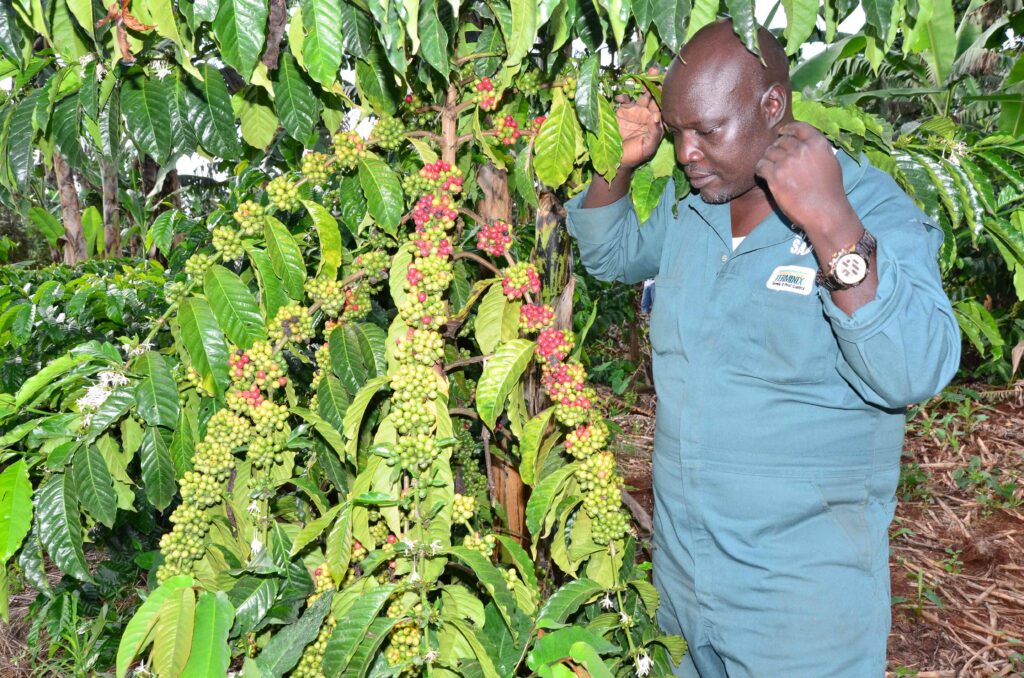
Venturing into farming
Lubega is now the director of Philly Mixed farm-Saayi at Saayi village in Ntenjeru sub county, Mukono district where he grows matooke, coffee, apiary and yarns.
He recalls that Kabushenga advised him to venture into coffee farming mixed with matooke since despite being a CEO, he was already doing the same which one would think he had it all!
“I started right away to think of a way forward. I decided to go to our cooperative as Vision group agents and borrowed about shs10m that I used to buy one acre of land here at Saayi at shs5m where I started establishing my farm. I started with banana plantation and later mixed in coffee,” he recalls.
Today, Lubega’s farm sits on 24 acres all planned with coffee and banana. He says he has continued buying land from the savings of the sales of his matooke and coffee.
Establishing the banana plantation
Lubega explains that, a banana plantation that is going to be mixed with coffee must be planted differently from one which is going to be for only bananas in regards with spacing, nutritional supplementation, pasta and disease management among others to enable the soil support production and productivity of both crops.
“After clearing the land where a plantation is to be established by ploughing and cutting some of the trees, I dug holes of 2ftx3ft and 2ft deep in spacing of 14ftby14ft. Therefore, an acre will take 150 banana plants instead of 450 plants in an acre for a plain plantation,” he adds.
At the time of digging holes, he separates the black soil with the red. He then mixes the black soil with manure which can be cow dung or chicken droppings and puts it back in the hole between two weeks to a month before planting your suckers.
He explains that it is important that you kill pests during planting time. He uses chemical or urine he collects from bars, pours it in big containers, mixes it with water, hot pepper and ash among others in which he deeps the suckers for 24 hours before planting them.
Here, I will have killed all the pests and their eggs which would destroy my plantation because if the pests infect a plantation, it becomes so costly to fight them out which thus proves cheaper to prevent than treat,” he says.
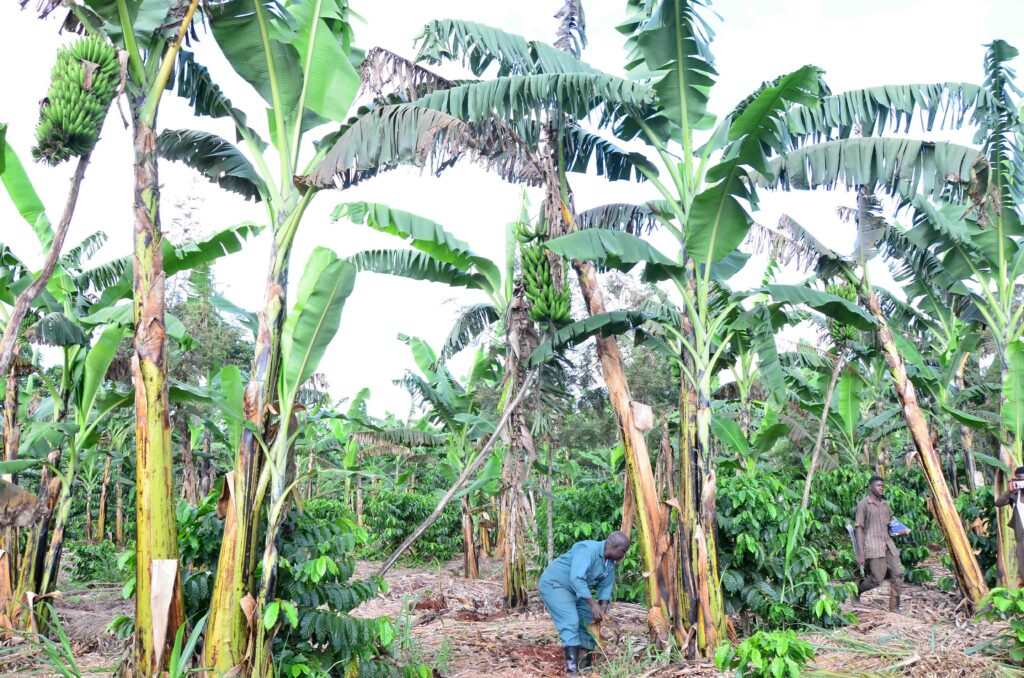
Best practices for a productive banana plantation
His banana plants are left with two suckers which help his bananas to get nutrients and put on big bunches which fetch him more money since he sells them in kilograms.
“Because my land is small yet I am into mixed farming, I add fertilizers every rain season using chicken droppings where each acre takes 15 sacks. We dig a small hole at the side where a sucker is, and pour the droppings and cover because we want to feed the sucker which will give us the next bunch,” he explains.
The plantation is also mulched all year through which he says it prevents rapid weed growth which reduces the cost of weeding but also retains water in the soil thus reducing water stress to the crops especially during the dry season.
“When mulching, we extend the mulch to the plant during the dry season to protect the roots from the scorching sunshine and in the rain season we create space around the plant 1ft away to keep the roots underground thus keeping the banana plants strong and firm in the ground,” he explains.
Because the plantation is located in a sloping area, he digs terraces to catch the running water as a way of preventing soil erosion and leaching of nutrients.
Growing coffee
His coffee shamba started with one acre and continued planting more as he received seedlings from both the central government and Buganda Kingdom through the ‘Emmwaanyi terimba program’.
“If you are to have a mixed plantation of coffee and bananas, you should plant bananas first there after you plant the coffee. This is because bananas will then provide shade to the coffee seedlings,” he says.
Lubega has planted its coffee plantation with Colonal cutting varieties. During planting, he digs holes of 2ft by 3ft in spacing of 10ft by 10ft. “With this spacing, I plant 250 coffee trees in an acre compared to 450 in where the plantation is for coffee only,” he adds.
After digging the holes, he mixes the black soil with manure then puts it back into the hole for at least a month before planting the seedling.
He says that earning from coffee depends much on the quality of the beans because bigger beans fetch higher prices on the market and also you get more kilograms.
“To increase my harvest, I established an apiary on the farm to facilitate pollination. Later, I was given a helping hand by the ministry of agriculture, animal industry and fisheries. I now have over ten bee hives from which I also earn shs800, 000 from honey a year,” he explains.
He also planted trees for shade and environmental conservation which he uses to plant yams which is his other enterprise from which he earns shs2m a year.
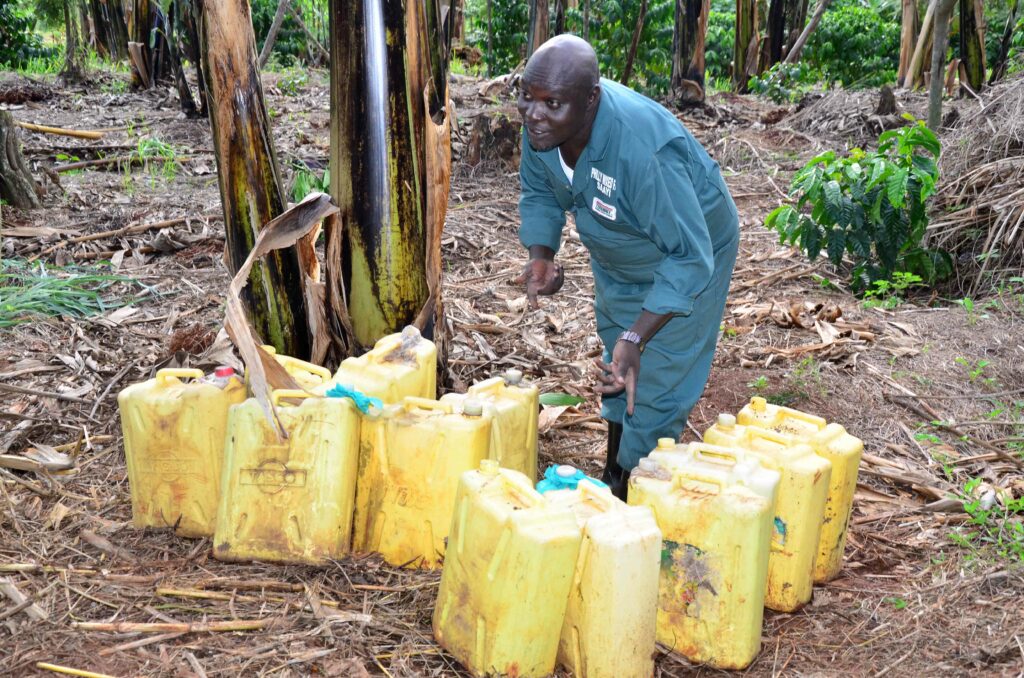
The harvest
Lubega sells his matooke in kilograms which he says is a better deal than selling a whole bunch. “For example, if my bunch weigh 70kg which the average of my bunches, and I sell a kilogram at shs1, 400, I will earn shs98, 000, or shs63, 000 from one bunch which at most could sell at shs30, 000 if sold wholesomely.
He says that from September to November last year, he would harvest 3, 000kgs every two weeks where each kilogram was selling at shs1, 400, which is an equivalent of shs4.2m and shs8.4m a month.
According to his records however, the harvest reduced from December, that he harvests 5, 000kgs a month yet even the prices reduced to shs900. This therefore means he earns shs4.5m a month.
For coffee, Lubega says he only picks ripened coffee and dry it on a rack or tumplines. “After they are dried, I process my coffee by hulling which is the process of removing the dried covering and remaining with clean beans referred to as FAQ (Fair to Average Quality),” he adds.
He says that last season he got 3,000kgs of FAQ and sold at shs6, 700 per a kilogram thus earning shs20.1m. He says that processing coffee helps get the husks that he brings back to the farm and use it as fertilizer.
Family business
Lubega says, that from what he says, he took a decision to take all his children to the garden especially during the holidays because they need to know how to make money from farming which is a known fact that it is the basis for Uganda’s economy.
“All my children are always here with us on the farm during their holidays and they have developed love for farming that the older son, Ibra Matovu, decided to join Bukalasa Agricultural college to learn more about agriculture as a profession which I believe will take the farm to higher levels,” he said.
His son Philly Lubega who is in P5 at Namiryango Boys Junior School, is one of the trainers during the training organized at the farm to equip farmers with best agronomic practices.
“I want to learn more about farming as a business because I have realized it is profitable and when I grow up, I would like to have my own farm besides supervising my family farm,” he says.
Developing the community
When you move around, it is evident that his neighbors have started borrowing a leaf from his farming system.
“Although people in this area have for long been growing coffee mixed with bananas, they have been doing it the ordinary way thus earning less. But since I established my farm and allowed residents to come and learn the best practices they can use in their farms, they have started changing their systems,” he says.
“Apart from training farmers in the best agronomic practices, I also encourage them to train and also interest their children into farming because it won’t only help create incomes and ensure food security but will also help to protect land where the children won’t think of selling it to buy boda-bodas but use it for farming,” he says.
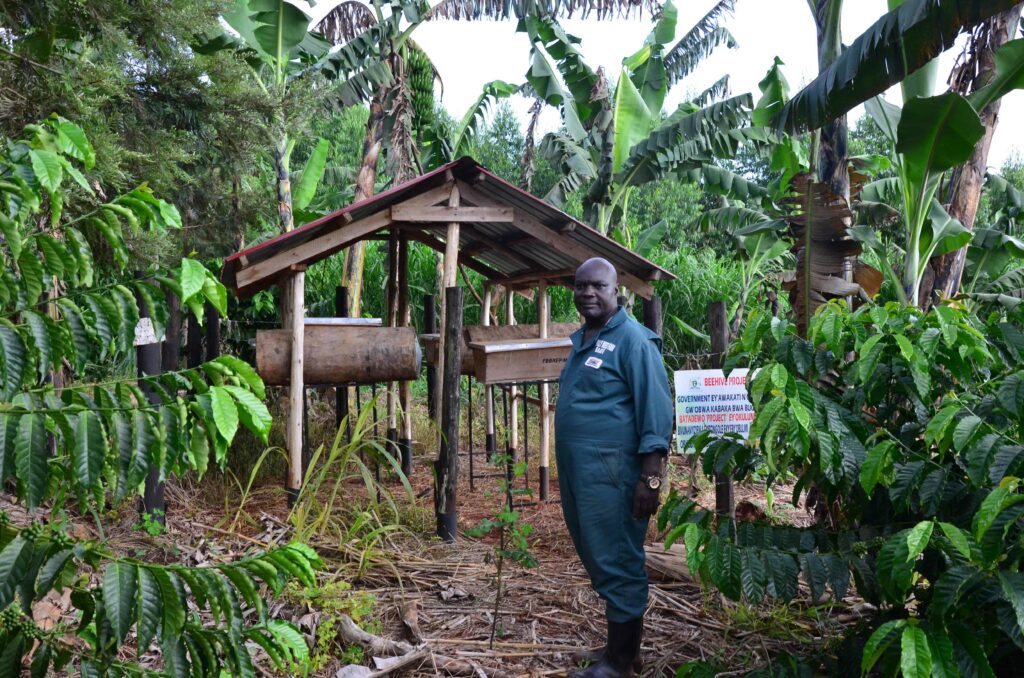
Employees
Lubega says that he has seven employees who are paid according to work done but averagely he spends shs2.5m a month on their salaries. He also spends about shs300, 000 on herbicides and shs6m is spent on buying fertilizers a year.
“I realized that giving a worker a permanent pay monthly, makes them lazy but when one knows he/she will be paid according to what they have done, they put in energy to accomplish work so that they can be paid,” he explains.
He also pays himself shs22m a year because he is among the employees as he gives the farm a lot of time to ensure it performs well.
“The children are also paid when they come to the garden according to what they do because if they don’t do it, I will have to pay someone else to do it anyway. This inspires them and shows that farming is a business that pays,” he says.
The challenges
Lubega, says that he is challenged by fake agro-inputs on the market which cause losses both for the money spent on buying but also for the harvest as the problem will remain affecting the crops.
“For instance, we have the Black coffee twig borer that affects the coffee stalks and experts in coffee have advised us on chemicals that can be used but on buying the chemicals expensively, the disease continues affecting the coffee and you see stalks drying and falling off,” he laments.
Fluctuating commodity prices is yet another challenge affecting Lubega, saying there is still a need for setting prices from the government to help farmers not depend on middlemen yet farmers invest more.
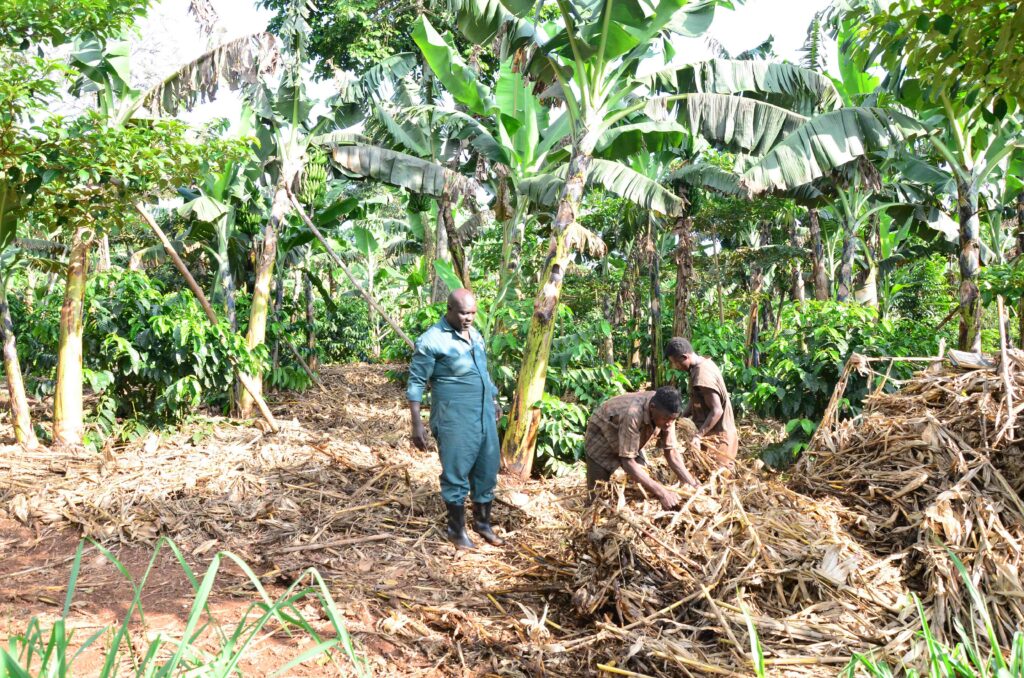
Future plans
One of Lubega’s plans is to venture into livestock especially dairy cows as a way of increasing the farm incomes but also get the dung that he will use as fertilizer in the plantation to minimize expenditures on buying manure from other farmers.
“I also want to add more value to my coffee besides FAQ and start making coffee. This is my bigger dream which I strongly believe will be realized in a short time to come,” he says.





